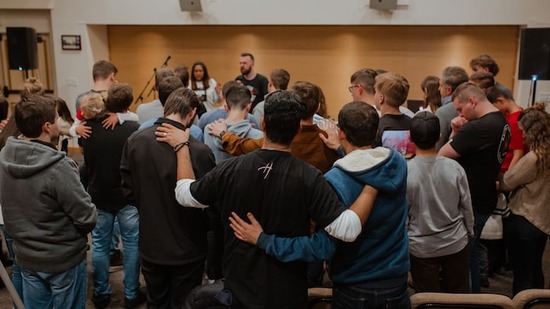Does the Adventist Church Have Youth Ministry Programs?
The Seventh-day Adventist Church has been organizing and operating youth ministry programs since 1879.
In our opinion, youth ministry is one of the most important ministries a church can have.
Being a tween or a teenager isn’t easy. And being a Christian teenager can come with its own challenges, because during those years, kids are still figuring out their identities, their convictions, their priorities, their values…all while dealing with social pressures, school pressures, and any number of family dynamics.
So we want to ensure that young people have a space where they feel heard and accepted, while also being challenged and encouraged to grow. We want to show them the joy, peace, and purpose that come with following Jesus. And one of the goals of youth ministry is to help the youth find ways to get involved in church and discover their own personal gifts.
Adventists work toward these objectives together as a worldwide church, and together in our smaller communities. Our programming varies from group Bible studies, campouts, retreats, workshops, service activities, and more.
But let’s get a closer look at what goes into youth ministry efforts in the Adventist Church:
- Overview, history, and goals of Adventist youth ministry
- Methods and approaches
- Why youth ministry matters to Adventists
To start with, here are the general things we seek to accomplish with our youth ministry efforts.
Overview, history, and goals of Adventist youth ministry
The ultimate, overarching goal of youth ministry is to help young people form a closer walk with Jesus.
Stemming from that, we also want to encourage them to take an active role in their churches and their communities.
After all, young people have been making waves in ministry since Bible times!
Just look at the prophet Jeremiah:
“But the Lord said to me:
‘Do not say, “I am a youth,”
For you shall go to all to whom I send you,
And whatever I command you, you shall speak.
Do not be afraid of their faces,
For I am with you to deliver you,’ says the Lord” (Jeremiah 1:7-8, NKJV).
No matter their age, young people have an important role in spreading the gospel and demonstrating the example of Jesus’ love, compassion, and friendship.
And by introducing them to Jesus and fostering their spiritual growth, we can develop an intrinsic motivation to serve Him and others. We want to empower youth to discover their talents, and to use their ideas and leadership skills to do ministry wherever they go, and whatever they do.
It’s amazing what youth can accomplish for God. In fact, youth ministry efforts in the Adventist Church were even started by youth! In 1879, two teenagers named Luther Warren and Henry Fenner created a ministry to serve young people.1 They connected with others through Bible study and prayer.2 As their efforts grew and became more organized, they called it the Adventist Youth Society and also expanded to reach young adults after their teen years, as well.3
Today, youth ministries and young adult ministries operate separately as age-related needs became more diversified. But many young adult programs and initiatives that are sponsored by the General Conference of Seventh-day Adventists, or the world church headquarters, are operated under the umbrella of the “Adventist Youth” program.4
Adventist Youth programming, promotion, and resource distribution are overseen by the General Conference Youth Ministries Department. Beyond that, youth ministry directors from each subsequent administrative tier will make the best use of the General Conference’s resources for their respective areas.
When it comes to the actual boots-on-the-ground ministry efforts, they tend to be organized at the local level.
Individual churches, or sometimes the conference offices that oversee many churches in a given area, will decide what programs would be most helpful and effective for the youth in their communities.
This means that available programs vary from church to church. And the bigger the church, the more programs they’re likely to have.
They’ll usually make use of the manuals, curriculums, or programming available from the General Conference or their respective division, but some ambitious churches or conferences might create their own materials and programs that utilize local talent and leadership.
In many areas around the world, Adventist youth ministries are categorized into two groups. 10-15-year-olds are known as juniors and 16-21-year-olds are referred to as senior youth. As a church, we want to make sure we’re providing the most relevant materials and activities possible.
A 12-year-old typically faces different challenges and has different concerns than a 17-year-old. So in larger areas that have a diverse makeup of ages among the youth, you’re more likely to find that activities and groupings are organized into these categories. However, in smaller communities, youth programming might include all the teens, with a little bit of overlap into the pre-teens and early young adulthood.
However a local youth program is structured, these ministries are all united in mission. We want youth to know that they’re valued, respected, and very much needed! So we aim to provide community as well as opportunity.
With a safe and encouraging community, teens can feel a sense of belonging with other believers. And with approachable opportunities to get involved in service or evangelism, we can also provide mentorship along with experience in both ministry and leadership.
It is our prayer, our hope, and our goal that these ministry efforts will encourage them to know and love God, serve others, and continue their spiritual walks as active Christians for the rest of their lives.
Methods and approaches to youth ministry
As previously mentioned, youth programming can vary from church to church, conference to conference, country to country, etc. It all depends on size, availability of resources, and the needs of each community.
But there are still common threads within each youth ministry program. Here are the most common ways churches serve and engage young people.
Sabbath school (Bible study and fellowship)
Sabbath school classes meet every Sabbath. Typically these classes happen before the main church worship service, but the timing can vary at some locations.
Similar to adult Sabbath school classes, the youth group meets to study and discuss the principles and concepts found in the Bible. They might use weekly lessons from a curriculum provided by the General Conference, or they might choose other materials.
But whatever framework they use, the idea is to study and discuss spiritual topics relevant to their age group. And while doing so, they can enjoy dialogue with their peers and build friendships.
Everything you’d need to participate in a Sabbath school class is provided by the church. So when you walk into a youth Sabbath school for the first time, don’t worry about coming empty-handed. There should be materials there for you to use to follow along and participate.
Sabbath school teachers for youth can be pastors employed by the church or local conference, or they might be volunteers from the congregation. Volunteer leaders are typically selected by the local church’s nominating committee. This ensures that they’re properly vetted and trained. This process often includes background checks, leadership training, child safety and abuse prevention training, and an overview of the recommended programming materials.
All this effort is to ensure that anyone tasked with youth leadership is prepared and qualified.
Small group gatherings

Photo by Tim Mossholder on Unsplash
Small groups are typically a more informal get-together.
They can be organized by church leaders, youth pastors, youth leaders, or even just enthusiastic church members.
The idea is to provide a safe place and time, in addition to church, for youth to gather, bond, and learn more about God, the Bible, and applying spiritual truths to everyday life. The activities also vary but most feature Bible study, devotionals, prayer, discussion, games, or going on fun group outings.
You can find these groups by looking at the church website or asking church members about them.
The best thing about small groups is that it helps youth get to know other young Christians. The size of the group helps interactions be more personal and meaningful.
Church roles for young people
Congregations as a whole also encourage the youth to get involved with service roles in the church.
One official youth position is to become a junior deacon or deaconess. Volunteers must be voted in by the nominating committee (local church members) and must be at least 12 years old. Their general responsibility is to assist adult deacons in running the church. There are a lot of behind-the-scenes jobs that help a church service run smoothly, and it can be an excellent and enjoyable learning experience.
Common responsibilities include helping with setup, organizing the communion service, taking up the offering, or ushering. Sometimes they’ll help with the sound system or with greeting visitors before church.
Youth can also help with a church’s song service, read scripture, or offer prayer during church. But depending on the size of the church, there could be all kinds of opportunities to get involved.
Speaking/Testimonies/Evangelism
There are special programs for youth to travel to other places (often on mission trips) to tell others about the gospel at evangelistic meetings like the Share Him Ministries.
Youth also have the opportunity to give a testimony to other youth at youth rallies and at church week of prayer events.
Youth rallies are typically organized by the regional officers of the Adventist Church, to make sure events can cover a larger area and involve more people. These rallies are often multi-day events that let the youth have fun together in a positive and constructive environment, while also offering several activities that help them learn more about important biblical principles.
Weeks of prayer are usually a week-long evangelistic event where Adventist academy students and church members join together throughout the week, most likely in the evenings, to hear a guest speaker and pray together. These events can provide a spiritual boost or reawaken enthusiasm that can sometimes be smothered by the day-to-day grind.
Pathfinders and Master Guides

Photo by Jonas Kakaroto on Unsplash
If you’ve ever heard of boy scouts or girl scouts, this program will seem very familiar. This program starts in the pre-teen ages and then teenagers can become leaders.
In general, the Adventist Pathfinder club is for ages 10-15. Kids can earn badges by completing activities in various areas of learning, such as Bible, nature, home economics, crafts, survival skills, recreation, and vocational development.
Pathfinders also learn about how Jesus is a part of all of these things. It’s a way to take the classroom knowledge of God and the Bible out into the real world.
Pathfinders are also known for its fun events like field trips, camping trips, inter-club gatherings, and the long-anticipated Pathfinder camporee.
There is also a Master Guide course for older members (aged 16 and older). This program trains Master Guides to be Pathfinder leaders.
Ambassadors
The Ambassadors youth organization is designed for 16-21 year-olds.
While Ambassadors don’t receive badges, they meet together in small groups where they talk about relevant issues young people face.
These issues can include deciding one’s career, how to live a Christ-like life, and how to witness to others. The group also gathers together for outreach opportunities.
Summer camps
Adventist summer camps are one of the few youth activities that require you to sign up and pay. And that’s only because it’s truly a full-fledged summer camp experience.
Adventist summer camps feature all your favorite activities from your typical summer camp—hiking, crafts, water sports, and team-building games—but with all the benefits of a Christian environment.
As campers learn to tie knots and tie-dye shirts, they’ll also get to learn about Jesus, love, the Bible, compassion, mercy, friendship, servant leadership, and more.
Older youth have the option of working at these camps as counselors, or in other camp departments. There are lots of youth on the payroll at Adventist camps that have been long-time campers beforehand!
Youth conventions
One of the largest Adventist youth conventions is GYC (Generation of Youth for Christ).
They hold a convention once every year to encourage revival among young people. They also encourage them to get involved in youth evangelism. They have powerful worship and music services that get many positive reviews each year.
In fact, many young people actually decide to get baptized at this convention.
Other common Adventist youth events are Adventist Youth for Christ in Canada, and several youth conferences or youth congress events held in different parts of the United States.
To find more information about Adventist youth events, a local Adventist church’s website often posts news about regional events, or it will have a link to the conference or union website that will list such announcements.
Ministry and witnessing opportunities
There are tons of ministry opportunities available for young people.
Some of these include summer canvassing programs or mission trips.
Canvassing programs, also referred to as Literature Evangelism or colporteuring, involve selling or distributing Christian literature from door to door. Each year, countless youth attest to the enriching spiritual impact this ministry has had on their lives. And it’s common for the youth to stay in touch with the people they’ve met during a canvassing program.
Mission trips involve going to another location, often another country, to “be God’s hands and feet” by serving the needs of the people in the area. Usually there is a primary project for a mission trip, such as helping build a school or church building, or setting up a clean water system, or teaching skills to the local kids.
Why youth ministry matters to Adventists

Photo by adrianna geo on Unsplash
The bottom line is: youth ministry matters because young people matter.
The Bible cautions everyone not to discount youth (Jeremiah 1: 7-8; 2 Timothy 4:12), and to make sure children are always welcome to join in and participate in learning and worship (Matthew 19:13-14).
And to best support youth in doing so, we have to be sure we’re meeting their needs and addressing their concerns.
So we create youth ministry programs to provide young people with a meaningful role in our church. And those youth will grow to strengthen the church and share the gospel throughout their lives.
But let’s face it, being young is hard.
School and social concerns are everything to a young person, and that’s a big part of why so many feel like their later school years are just one big identity crisis. It’s a complex process to figure out who you are, as well as what you believe and why.
We want to help young people know that they have a special, vital place in the Seventh-day Adventist Church. They can benefit from a support system that leads them through life’s dilemmas with biblical answers and Christian companionship, and provide opportunities to:
- Make life-long friends
- Meet older Christian mentors
- Grow in their knowledge of the Bible
- Grow in their relationship with Jesus
- Answer their deepest questions about their identity and purpose
- Learn how to use their talents to serve God
- Learn how to live a Christ-like life
Buz Menhardt, Associate Pastor of the New Market Seventh-day Adventist Church, has seen how youth ministry has changed the lives of the young people he’s known.
“Over time, the youth grow up, they mature, and oftentimes they’ll continue in the same kinds of ministry they were involved in as a young person. And they’ll be able to reach their peers and those younger than them.”
Adventist youth ministries are changing the lives of young people everywhere, empowering them to understand God’s plan for them.
You can start your search for youth activities by looking up the nearest Adventist Church, where you’ll find local information and announcements about larger events. You can also follow announcements on gcyouthministries.org/.
Or if you’re interested in activities for younger children
- Seventh-Day Adventist Pastor’s and Elder’s Handbook for Youth Ministry: https://www.gcyouthministries.org/wp-content/uploads/Pastors-and-Elders-manual-on-youth-ministry.pdf [↵]
- Ibid. [↵]
- Ibid. [↵]
- Ibid. [↵]
Related Articles
Questions about Adventists? Ask here!
Find answers to your questions about Seventh-day Adventists
More Answers
Why Many Seventh-day Adventists Choose a Vegetarian Diet
Why Many Seventh-day Adventists Choose a Vegetarian Diet?You may have an Adventist friend who is vegetarian, or maybe you’re attending a Seventh-day Adventist Church for the first time and notice the potluck doesn’t have any meat. This isn’t unusual in Adventism. In...
The Health Benefits of Fresh Air You Should Know About
The Health Benefits of Fresh Air You Should Know About“When you can’t breathe, nothing else matters,” the American Lung Association tells us. And while that’s true, the kind of air you’re breathing will determine the health benefits you experience. Breathing fresh...
What Do Seventh-day Adventists Choose to Eat?
What Do Seventh-day Adventists Choose to Eat?Food blogs overwhelm the internet; food fads are all the rage; and copycat and healthy versions of food are the subject of many a get-together. Eating—and eating the best way—is a big deal. And everybody has a different...
10 Incredible Ways Sunlight Can Improve Your Health
10 Incredible Ways Sunlight Can Improve Your HealthAre you concerned about sunlight’s negative effects? You might be the one who lathers on the sunscreen and covers up when you go outside. Or maybe you avoid being outside as much as possible. You might be surprised,...
Why Is Water So Important?
Why Is Water So Important?We all know that water is a substance we can’t live without. It quenches our thirst and keeps us hydrated on the inside. And it’s necessary for hygiene and cleansing on the outside too. But did you know that the cleansing properties of water...
Ellen White’s Writings and the Adventist Health Message
Seventh-day Adventists are known for their emphasis on healthy living. And Ellen G. White was a significant influence in the development of this priority and practice among Adventists.
Health Clinics
Ellen White and Adventist Healthcare—Ahead of Their Time Medical care in the mid-1800s was primitive, to say the least. Basic concepts we take for granted—such as proper handwashing or recognizing the dangers of bloodletting—were nonexistent. And doctors often had...
What Did Ellen White Teach about Vegetarianism?
What Did Ellen White Teach about Vegetarianism?One thing you might have heard about Seventh-day Adventists is their emphasis on a vegetarian lifestyle. If you’re wondering why that is, it goes back to our church’s humble beginnings: As Adventists studied the Bible,...
How Ellen White’s Teachings Can Improve Your Health
How Ellen White’s Teachings Can Improve Your Health Healthcare in the nineteenth century was said to leave “more disease than it took away” with its use of bloodletting and “medicines” like mercury and arsenic.1 As people questioned these methods, new approaches...
Change Your Perspective on Life with These 5 Mindsets
5 Biblical Mindsets to Change Your Life for the Better Sometimes, life is just plain hard. There’s no way around it. So would thinking about things differently really change anything? Our perspective on life, and everything it throws at us, affects more than we’re...
Bible Promises for When You’re Worried or Fearful
Bible Promises for When You’re Worried or Fearful The Bible is full of beautiful promises that can comfort us in a variety of situations. They can give us hope when we are hopeless, make us feel grateful for God’s love, and comfort us when we’re grieving or suffering....
12 Practical Ways to Overcome Worry
12 Practical Ways to Overcome Worry DISCLAIMER: This content is for informational purposes only. It does not constitute any professional medical advice and is not intended as a substitute for professional mental health therapy. It’s easy to get stuck in a cycle of...
How the Bible Talks About Worry, Fear, and Anxiety
How the Bible Talks About Worry, Fear, and Anxiety Worry and fear are the ingredients of anxiety. It’s easy to see how the world isn’t perfect—and the anticipation of a bad event or experience (that may or may not even happen) can end up draining the peace and...
How to Calm Anxious Thoughts, Using the Bible
How to Calm Anxious Thoughts, Using the Bible You were expecting a phone call from your daughter half an hour ago, and she still hasn’t called. She’s also not answering your calls. You feel your heart thumping as your thoughts race: What if she’s been in a car...
What You Should Know About the Adventist Health Studies
What You Should Know About the Adventist Health StudiesYou may have heard that Seventh-day Adventists care about health. But what you may not know is that Adventists have been the subjects of long-term research into lifestyle and health. Since 1958, researchers from...
Benefits of Sunlight
Yes, There Are Health Benefits of SunlightDespite the bad reputation it’s gotten, sunlight is generally associated with positivity, as shown by songs like “You Are My Sunshine,” or phrases that refer to delightful people as having a “sunny disposition.” There’s a...
Why Your Body Needs Rest for Optimal Health
Why Your Body Needs Rest for Optimal HealthStruggling to think straight? Wondering why you can’t remember that important tidbit you heard earlier today? Feeling like your emotions are about to explode? These are just some of the symptoms that can reveal your need for...
The Seventh-day Adventist Diet: One of Our Key Longevity Secrets
The Seventh-day Adventist Diet: One of Our Key Longevity SecretsOats, avocados, lentils, tofu—probably not what you first think of in a standard American diet. But if you show up at the home of an Adventist, chances are you may be served one of these staples. Out of a...
Why You Need Fresh Air
Why You Need Fresh Air“When you can’t breathe, nothing else matters,” the American Lung Association tells us. We couldn’t agree more! Breathing in clean air is an essential part of caring for our bodies, which God has given us. Together with other health principles,...
Sabbath Meal
Everything You Need to Know About Sabbath MealsFor Seventh-day Adventists, sharing a Sabbath meal with friends and family is one of the most special and memorable parts of the Sabbath. That’s why we want to share with you all about Sabbath meals and why they’re such a...
Adventists and Healthy Living
Adventists and Healthy LivingWhat’s the Adventist “Health Message” All About? One thing Seventh-day Adventists are known for is their emphasis on living healthy lives. Since our bodies are living temples of the Holy Spirit (1 Corinthians 6:19, 20), we strive to stay...
Water’s Importance—Physical Benefits and Spiritual Applications
Water’s Importance—Physical Benefits and Spiritual Applications We all know that water is a substance we can’t live without. Not only does it quench our thirst and keep us hydrated from the inside, but it’s necessary for hygiene and cleansing on the outside as well....
How Important is a “Day of Rest?”
How Important is a “Day of Rest?” Why God Created a Day for Downtime by Martin Casper Do you ever experience the feeling of complete overload? Do you feel like the only way you can get ahead is by slamming it 24/7? I hear these types of comments more and more...
7 Reasons Why a Day of Rest is Important
7 Reasons Why a Day of Rest is ImportantWe live in a fast-paced world. It seems as if success is measured in how much you can do in a short amount of time. (Extra points for the service or product that is available 24/7). The idea that we will be more successful if we...
How do Adventists choose what to eat?
How do Adventists choose what to eat?Every day, parents go through the ritual of getting their kids to eat what is healthy and good while trying to steer them away from what can hinder the growth of their developing bodies. Nutritionists work with their clients to...
How Can I Have a Better Marriage?
Is it possible to have a happy marriage?
Why are many Adventists Vegetarian?
Why are many Adventists Vegetarian?The diet intended for man is outlined in Genesis 1:29, “And God said, ‘See, I have given you every herb that yields seed which is on the face of all the earth, and every tree whose fruit yields seed; to you it shall be for food.’”...
Didn’t find your answer? Ask us!
We understand your concern of having questions but not knowing who to ask—we’ve felt it ourselves. When you’re ready to learn more about Adventists, send us a question! We know a thing or two about Adventists.
























